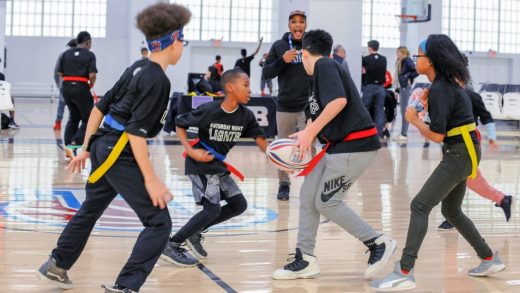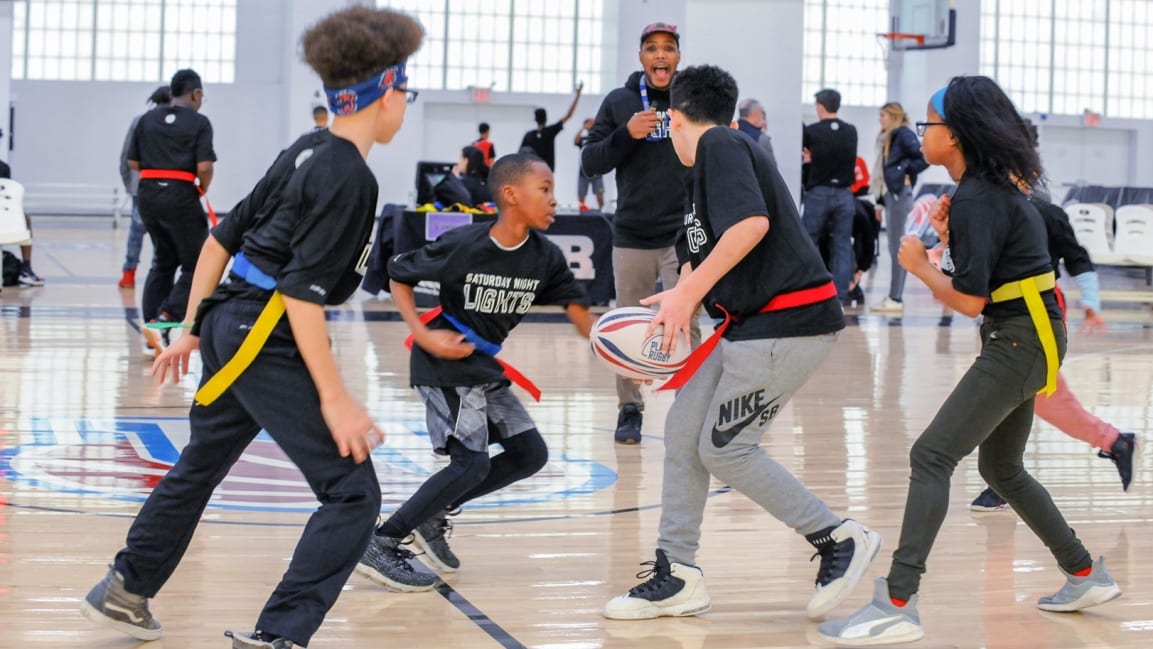The other SNL: New York City’s athletic approach to curbing rising gun violence
Emily Campos has always had a knack for sports. But after her spinal surgery, she had to pivot from her original athletic love, basketball, to soccer. In 2015, as a teenage newbie to the beautiful game, she entered a program in East Harlem, where she was the only girl. “They were a little mean at first!” Campos recalls of the other boys—but it made no difference: “I went from being this player that had no idea how to kick a ball around, to being one of the top scorers in the league.” The program that she came up in, City in the Community, was led by coaches of New York City FC, the MLS team that’s attracted the talents of world stars such as Frank Lampard and David Villa.
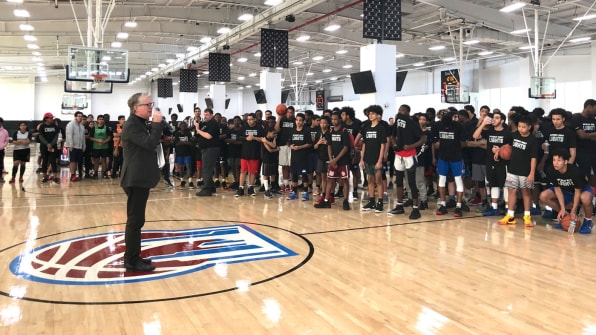
That initiative is SNL—no, not that one—Saturday Night Lights, established by the Manhattan District Attorney’s office in 2010 as a “gun violence prevention strategy.” Now active in 20 locations in high-risk neighborhoods in all five boroughs, it welcomes school-aged children to participate in organized sports on Saturday nights and beyond, in an effort to keep them busy during high-crime times and to engage them in leadership and team-building skills. During the pandemic, the program mostly went virtual, centering around online skills sessions and guest talks from athletes. But now, as gun violence has soared in New York, reflecting surging rates across the country, the mayor’s office will assume responsibility for the program, with new investment, and a plan to expand to 100 locations by July. As it scales up, it’ll keep the core tenets it’s always had: Saturday night offerings in vulnerable areas, high-quality coaching, and the committed involvement of New York’s police department and prosecutors.
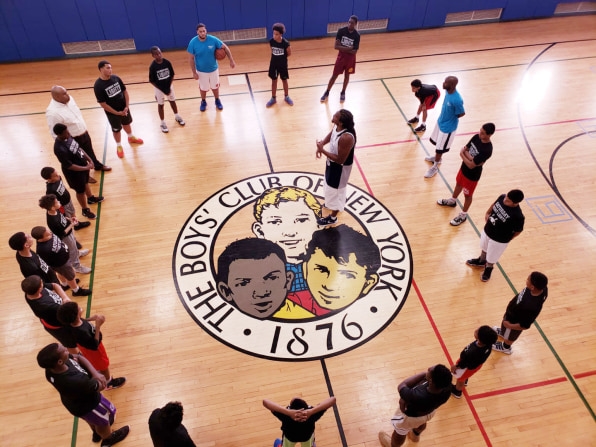
[Photo: courtesy Boys & Girls Club New York]
SNL started in 2010, the same year Cy Vance assumed the role of Manhattan DA, when the office realized that the Police Athletic League Gym in West Harlem, which usually offered sports programming for young people, was closed on weekend nights, when crime rates tend to surge, so precisely when vulnerable teens needed to stay occupied. “That made no sense to us at all,” Vance says. So, in the first iteration of SNL, they brought in coaches from Pro Hoops to offer “world-class basketball programming” to kids ages 12 to 18, providing, Vance says, “a safe and positive place to be on Saturday nights.”
“Within the year, it turned out to be a hit,” he says; kids came to play ball in Harlem from the Bronx and Queens. A decade later, SNL has served more than 20,000 kids, partnering with 13 community organizations to unlock unused spaces around the city for sports offerings—basketball, soccer, volleyball, dance—in 20 locations. Partners are required to provide sessions on Saturday nights, traditionally around the hours of 5 p.m. to 9 p.m., but now with more flexibility, which is what the city provides funds for; many are also open on Friday nights and at other times. There’s no formal sign-up process, and there are no eligibility requirements apart from age; prospective players can show up and join on any given night, at any time of year, as long as there’s space at the specific site. Locations also must open 46 weeks per year. “We want the kids to know that they have a place to go every Saturday night,” says Estelle Strykers-Santiago, director of community partnerships for Vance’s office.
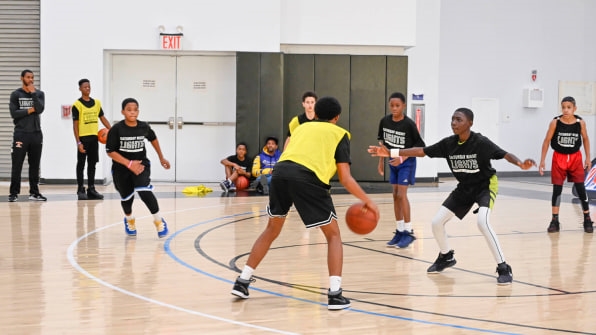
Each partner’s offering can look different. But one common thread, and a requirement, is high-quality, professional coaching. At the Boys’ Club of New York, an East Harlem-based youth development organization primarily for boys ages 7 to 18, SNL attendees (both boys and girls) engage in intense, energetic workouts known as “skills and drills,” says chief program officer Carlos Velazquez, followed by scrimmaging or skills tournaments. On some weeks, they’ll play other community locations in competitive leagues. Once a year, all the SNL partners unite at Basketball City in the Lower East Side for a sports day filled with different activities.
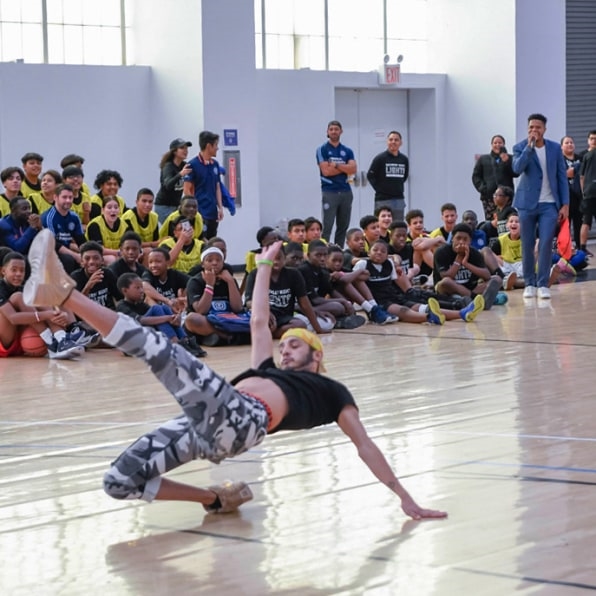
Despite the high level of training, the “skills and drills” are broader than just athletics. Locations may bring boys and girls academic help, connections with tutors, career development seminars, and themed nights focused on different character traits. Many of the adolescents who attend may already be involved in gang activity. It’s an opportunity to mold minds, Velazquez says, at a time when teens will have to make life-shaping decisions. While the DA’s office admits there’s no statistical proof that SNL has led to lower crime, it says it’s sometimes brought “feuding” NYCHA (New York’s public housing) communities together to play ball on neutral ground and engage in conversation. “We’re able to get the staff and the kids to talk to each other, and kind of diffuse brewing situations,” Strykers-Santiago says.
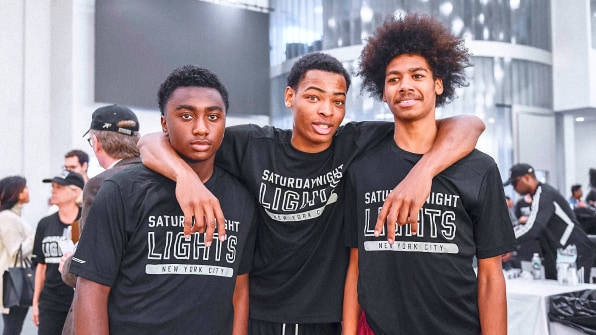
That’s especially important now. Mirroring the trend across the U.S., gun violence spiked enormously in New York City in 2020, likely because of lockdowns and pandemic and economic stressors. And the trend has continued this year: 505 people have been shot in New York City as of May 9, the most at this point in the year over the past decade. According to the latest NYPD statistics, shooting incidents have increased by 209% over the same 28-day period in 2020, and murders by 68%. And, while headlines focused on a shooting in Times Square on May 8 that injured three people, the heightened violence has been generally concentrated in the areas where shootings most frequently occur: 37% have been in Brooklyn, and 31% in the Bronx.
The nation’s biggest gun-violence advocate groups consistently recommend community-based crime prevention strategies. That’s in combination with legislative action such as gun control, but in New York, gun restrictions are already tight, and most guns are coming into the state from elsewhere. That, combined with the fact that much of the violence in the state is gang-related, makes the community approaches especially key. “There are ways to address safety in our communities that are right in front of us,” Vance says. In response to the high rates, and the expected summer surge of shootings—just on the 4th of July weekend last year, 64 people were shot in the city—Mayor de Blasio unveiled a new campaign, Safe Summer NYC, that merges more traditional crime-prevention approaches with community-based interventions, including a $5-million-a-year investment in the SNL program, to expand it to 100 locations by July. The mayor’s office, specifically the Department of Youth and Community Development, will take over the program from the DA, to shoulder control over the expansion of what it views as a valuable part of the new crime-safety package.
But the DA’s staff will still be just as heavily involved—as will the NYPD. In the past, police officers have come to SNL sessions to play in scrimmages with the kids, with the idea that these face-to-face interactions would build trust and rapport between the community and law enforcement—which is especially important with mistrust at a high following the murder of George Floyd and its aftermath. With these heightened tensions, it seems plausible that young adults involved in gang activity, or skeptical youths generally, may not want to attend a program whose centerpiece is law enforcement.
Perhaps the transition from the DA’s to the mayor’s office will change perceptions for the unconvinced. Yet, in the mayor’s model, police will play even more of a role, with each precinct’s Youth Coordinating Officer expected to know about the neighborhood’s SNL offering and to make visits. As the program expands, the police department is also making recommendations as to which areas would most benefit from SNL branches.
But Velazquez views the police-community interactions as an essential part of SNL. On some Saturdays at the Boys’ Club, kids play a game against the officers of Precinct 5. “We know that these boys are running into these officers in the street,” he says. “A familiar face might neutralize some initial tension.” He adds: “It’s not like, now they’re best friends and they go out and have pizza every week. But at least they know who each other are.”
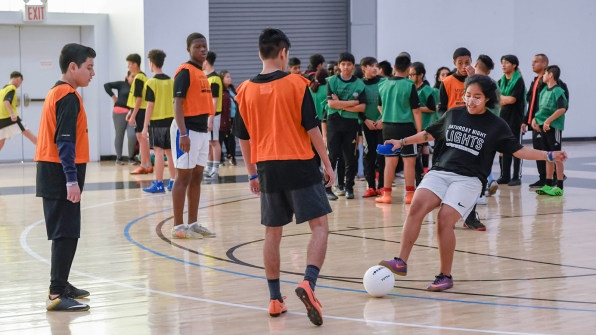
Campos, who’d joined the NYC FC soccer program in 2015, is now 24 and works at the DA’s office as the SNL coordinator. In her time, she’d played soccer games with officers. “I was very anti-cop when I was a kid,” she says, “so I was very hesitant when they first started showing up. Like, what are they doing here?” But she came around to the idea, as they would remember her by name week to week and chat with her as they gave informative presentations to the group about their community role. “I know a lot of people may think of this as, oh, another law enforcement program,” she says. “But I do think there’s something special about the way the DA created this partnership.”
Campos is leading SNL’s transition to the mayor’s jurisdiction, which is an especially big task after the pandemic-related pivot to online activities. As they try to reregister some of the kids they’ve lost, she’s also focusing on expanding hours and activating more spaces with the help of various city agencies. (Velazquez wants to take his “pop-up skills and drills” and 3-on-3 games to parks and NYCHA developments.) She also wants to add new sports such as baseball, boxing, karate—and possibly even online gaming.
“I have a very special relationship with sports,” she says, “because it was the way I made friends—it was the way I felt connected with the world.” But after her surgery, she saw playing sports in a different light—not as a springboard to try to make it as a pro athlete, but as a common language with which to have broader conversations with others in the community and a way to build trust and relationships. Sports is just the hook. “It’s not about you just walking in the building and playing basketball,” Velazquez says. “We’re talking about life. We’re talking about the world. We’re going to take full advantage of having you in our space.”
Fast Company , Read Full Story
(46)

